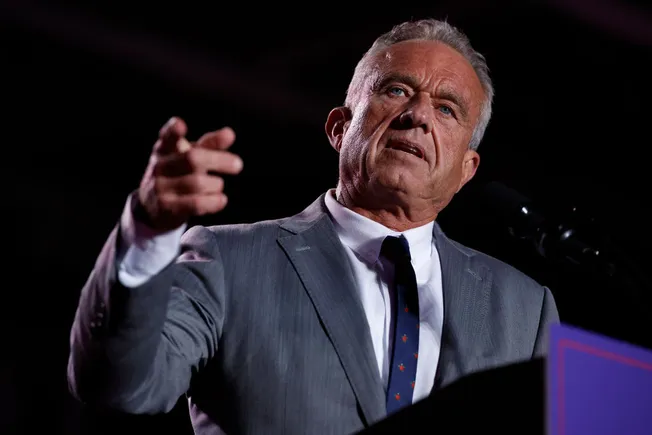
Robert F. Kennedy Jr. made a pledge to eliminate processed food from school lunches “immediately” if he was given a position in a second Trump administration.
Now that President-elect Donald J. Trump has selected Kennedy to head the Department of Health and Human Services, Kennedy would have wide-ranging authority over the Food and Drug Administration, which regulates around 80% of the country’s food supply. While he still faces confirmation by the Senate and is thought by some to be a controversial pick, some of his views around reforms are getting support from health experts.
Kennedy has targeted ultra processed foods for instigating the obesity epidemic, and has said they should be removed from school lunches. It’s a noble idea, food policy experts say, but these directives can be difficult to mandate.
“I’d be pleasantly surprised if he could reform the school lunch program, as most public health officials I know would say these are great goals to aim for,” says Marlene Schwartz, the director of the Rudd Center for Food Policy & Health at the University of Connecticut. “I think most people in my field are taking a wait-and-see approach because this kind of idea doesn’t usually come from Republican administrations.”
His view on food dyes has also attracted headlines. “The first thing I’d do isn’t going to cost you anything because I’m just gonna tell the cereal companies, take all the dyes out of their food,” Kennedy said during the presidential campaign.
The FDA has banned the use of Red Dye No. 3 in cosmetics since research in animals linked it to cancer, and the agency has promised it would also seek to extend the ban to foods and drugs.
Kennedy has singled out specific cereals in his statements on food dyes, saying on November 6, “Why do we have Fruit Loops in this country that have 18 or 19 ingredients, and you go to Canada and it’s got two or three?”
Newsweek revealed this claim is false, as both the Canadian and U.S. versions of Froot Loops contain 27 ingredients, including substances that would place the cereal in the category of “ultra-processed.”
Pesticide use has also been a hot-button issue for Kennedy. In an interview with Joe Rogan, he railed against the mass-spraying of glyphosate on wheat and its alleged link to celiac disease and gluten allergies beginning in 2006.
Kennedy’s outlook on food policy circles back to his claim of how regulatory agencies such as the FDA have been working closely with corporate America to enhance profits rather than to benefit consumers. He told MSNBC that he plans to fire hundreds of FDA staff, including those in areas such as nutrition.
“There are entire departments, like the nutrition department at the FDA … that have to go, that are not doing their job,” Kennedy told MSNBC.
Mary Summers, a senior fellow at the University of Pennsylvania who lectured on the politics of food, told the New York Times about Kennedy: “On the one hand, he’s claiming he’s going to dismantle it all. On the other hand, he’s claiming, ‘I’m going to regulate. I’m going to go to war for you and battle all this bad stuff in your food.’ And those two things don’t go together.”
Kennedy will also have authority over the update of the next iteration of the Dietary Guidelines for Americans, a set of recommendations for healthy eating. But Schwartz said he’ll be reined in by the checks and balances inherent in updating such a legacy initiative.
“Congress has increasingly been scrutinizing who’s on that committee to update the guidelines, so I don’t think he can single-handedly influence a process that is very transparent,” she says.
Kennedy has also voiced more controversial health concerns, including the danger of fluoride in drinking water, which he says should be banned altogether, and the benefits of raw milk, which has an increased risk of bacterial contamination. He has also said seed oils are poisoning Americans.
